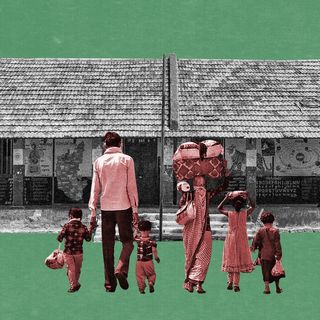An Indian woman has started an online petition on Change.org urging Prime Minister Narendra Modi to tell Indian men to share household chores equally with women. At present, her petition has 70,060 signatures, and aims to reach 75,000.
“Unequal distribution of unpaid household work has rendered the harshest blow to women across India during this lockdown. Yet, women’s care work continues to be invisible and no one wants to address this gross imbalance,” Subarna Ghosh from Mumbai, co-founder of an NGO called ReRight Foundation, wrote in her petition. The absence of domestic helps under lockdown, has also reinforced existing sexist gender roles. Given that her husband, a banker, was “not the type to help with housework,” Ghosh was reeling under the double burden of managing her job as well as the house. To register her protest at home, she stopped doing dishes and laundry, and that’s when her husband and children realized how upset she was, and cleaned up the mess. “The sink was overflowing with unwashed dishes and the pile of laundry grew bigger and bigger,” she told BBC.
Ghosh said that the “personal is political,” and that’s why she decided to amplify her exasperation against this unfair burden of housework. “If Mr. Modi can inspire us to light lamps and clap in solidarity, he can inspire us to correct an unfair norm that discriminates against women in every home,” her petition reads. In early April, Pinarayi Vijayan, Chief Minister of Kerala had also urged men to “help women in household chores during lockdown.” And, although the CM’s statement had drawn a lot of flak for reasserting the notion that household chores are, in essence, a woman’s responsibility by asking men to merely share the burden, several people had also lauded the fact that a politician took a stand on the issue.
Related on The Swaddle:
Global Analysis Says 31 Million Female Workers Face Job Cuts Due to Covid19
In India, the belief that women are the ones in charge of housework is so deeply embedded in our psyche that even women, despite being frustrated and overwhelmed by never-ending household chores under lockdown, cannot come to terms with the idea that men should contribute equally. When Ghosh discussed this unfair distribution of responsibilities with women in her neighborhood, who are also reeling under the increased workload, their responses exposed this internalized gender bias: “Many asked me, ‘How can he cook or clean?’ Many, in fact, praised their husbands for being easy-going. They’d say, ‘He’s very nice, whatever I cook he eats without complaining.'”
While the unfair burden of domestic chores and childcare on women is not unique to India, statistics from the country portray a staggering gender gap. A report by the ILO in 2018 found that while none of the countries surveyed by the organization depicted the ideal gender parity in terms of men’s contribution to unpaid housework, in India, men shouldered less than 10 percent of the burden. According to a report by Oxfam, Indian women, cumulatively, perform around three billion hours of unpaid domestic work everyday. And, if this domestic work was assigned a monetary value, it would add trillions of rupees to India’s GDP, according to the report.
“Does the handle of a jhaadu (broom) come printed with the words: ‘to be operated by women only’? What about the manual of the washing machine or gas stove? Then why is it that most men are not doing their share of housework?” Ghosh questioned.
“…[In India] more men listen to Mr. Modi than their own wives,” Ghosh’s husband said, in response to his wife’s petition.




